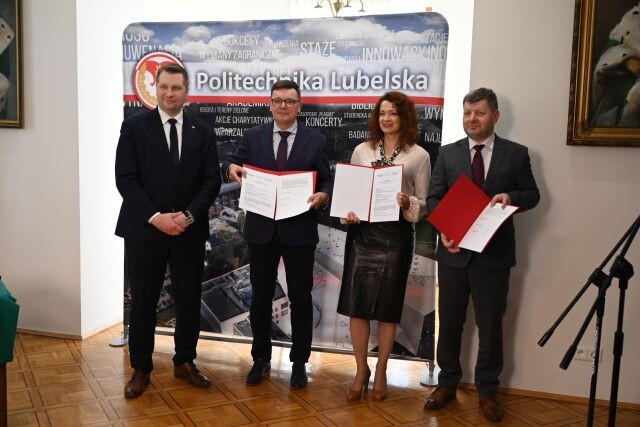The assumptions of the cooperation agreement on the President Lech Kaczyński Via Carpatia Polytechnic Network signed by the Białystok, Lublin and Rzeszów Universities of Technology include supporting vocational education in technical techniques, organizing study visits and research internships, creating innovative fields of study, building inter-university research teams and creating an intelligent competence map cloud.
The agreement on establishing the Network was signed by the university rectors: Dr Eng. Marta Kosior-Kazberuk, Rector of the Bialystok University of Technology, Prof. Eng. Zbigniew Pater, Rector of the Lublin University of Technology and Prof. Eng. Piotr Koszelnik, Rector of the Ignacy Łukasiewicz Rzeszów University of Technology.
“The use of the potential of the Via Carpatia Polytechnic Network assumes not only use of it as a communication route but above all as a platform for cooperation within Eastern Poland. It is absolutely noteworthy”, said Minister of Education and Science Przemysław Czarnek announcing that three universities of technology will receive PLN 10 million annually for 3 years for the implementation of Via Carpatia activities: research (PLN 3 million), didactic (PLN 3.5 million) and commercialization (PLN 3.5 million).
Minister Czarnek also emphasized that the creation of an academic network is an important signal for young people from eastern Poland, opening new development prospects for them. “It is worth staying in this region and studying here at technical universities”, added Czarnek.
The rector of the Lublin University of Technology, Prof. Zbigniew Pater said that Via Carpatia is an international route that runs via Białystok, Lublin and Rzeszów.
“In each of these cities, there is a technical university, which has its own specificity and has unique facilities. If we look at the potential of our universities, we can confidently compete with the largest universities of technology, both in terms of staff and the number of students. We have a lot of talented young people who often cannot afford to study in large centers”, said Prof. Pater.
Adrian Andrzejewski





